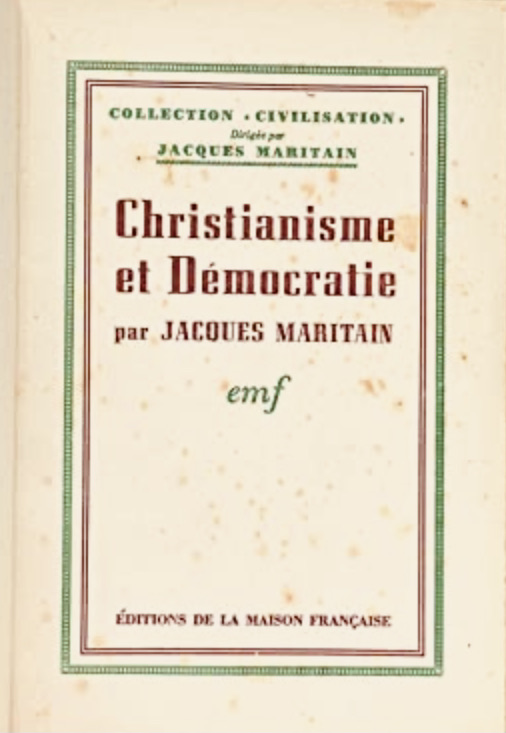Edward Carr & Simone Weil: Seeds in the Soil?
Ronald KL CollinsThe new faith, reversing the nineteenth-century trend, will lay more stress on obligations than on rights . . . .
Read those words and one almost automatically thinks of Simone Weil’s 1943 “Draft for a Statement of Human Obligations” essay and her extended treatment of its ideas as formulated in a draft report penned that same year for the Free French Committee – what posthumously came to be known as The Need for Roots.

The idea of a “new faith” combined with the elevation of obligations over rights seems so characteristically Weil . . . and it is. Nonetheless, if one turns the clock back in time to 1942, one finds those exact words in a then just-released book by Edward Hallett Carr, the famed British historian, assistant editor of The Times, diplomat, and professor of international politics at the University College of Wales. The book: Conditions of Peace, the same book from which the words quoted above were drawn.
Carr’s book, released while the Nazis were still advancing, argued that the only way to prevent another world war was to confront the crisis of the times: the “lack [of] a sufficiently compelling moral purpose.” Or as Carr also stated: “The crisis cannot be explained – and much less solved – in constitutional, or even economic, terms. The fundamental issue is moral.”
Conditions of Peace was a book of which Weil was aware as evidenced by her notes in Écrits de New York et de Londres. Of course, that Weil may have read certain points made by Carr does not mean that she embraced this or that argument in his book (let alone the theses of his many other books), or that particular tenets of her thought amounted to a carbon-copy of his. To be sure, there were points of disagreement, for example, Carr’s plea for a “consumer” culture.

Before saying more about Edward Carr and The Conditions of Peace, it should be mentioned that there was another book, also released in 1942, that caught Weil’s attention. That book was Christianity and Democracy and The Rights of Man and Natural Law by Jacques Maritain. As Eric Springsted has noted: Weil’s 1943 essay “What is Sacred in Every Human Being?” likewise addressed the question of rights, but this time in response to Maritain. “The notion of rights, launched across the world in 1789,” Weil stressed, “was by its internal insufficiencies impotent to exercise the function that was given to it.” Thus, Springsted observed: “Especially striking [in this 1943 essay] is her rejection of rights as the moral basis of our interactions . . . .” In this respect, Springsted has also flagged another important fact, namely, that Weil quoted Maritain in The Need for Roots, albeit disapprovingly so: “the notion of rights is even deeper than that of moral obligation, for God has a sovereign right over his creatures and he has no moral obligation to them” (NR, 277-278).
What all of this suggests is that the 1942 writings of Carr and Maritain drew Weil out when it came to the question of rights and obligations. How she responded to each is a matter for future and more extended discussion. For now, it is enough to note their role, however significant or insignificant, in the maturation of Weil’s philosophy.
Having said all of the above, let us move to the pages of Conditions of Peace where one finds hints of Weil’s thinking, hints that hover over some of Carr’s words. If Weil was indeed somewhat taken by those words, she gave them new and extended meaning, transformative meaning. With that warrant, let us turn to some of Carr’s words.

What to do after the war? That question preoccupied Edward Carr as he typed out what became the Conditions of Peace, a book premised on the allies prevailing in the war. That same matter gripped Weil’s attention as she focused, day and night, on the work she was assigned by the Free French Committee, the work of articulating those postwar principles on which France should be reconstructed. Both Carr and Weil were dubious of a world in which the operating norm was the idea, as Carr put it, of “progress as a normal condition of civilised human existence” or the hope of “automatic and effortless prosperity.” Change, radical change, was needed. For Carr such change was concerned with the instrumentalities of government, both at home and in the world writ large. For Weil that transformation certainly included structural matters as evidenced by the various reports she wrote such as “Remarks on the New Draft for a Constitution,” “The Basis for Constitutional Reform,” and “The Legitimacy of the Provisional Government.” But much more was needed, and that something more was a spiritual transformation. In several significant ways, that is what really defined Weil’s thoughts which she would develop in time, a short time.
Our civilization is in danger of perishing for lack of . . . a deliberate and avowed moral purpose.
— Edward Carr, Conditions of Peace
Those words caught Weil’s eyes, so much so that she flagged them in her reading notes. Carr concluded Part I (“Some Fundamental Issues”) of his book with a chapter titled “The Moral Crisis.” While the character of Carr’s moral concerns was different from Weil’s, they agreed that the absence of such concerns produced a political crisis. Said Carr: “The moral crisis of the contemporary world is the breakdown of the system of ethics which lay at the root of liberal democracy . . . .” That crisis, he maintained, was due in meaningful part to the “[b]elief in infinite progress rather than any clear conception of an ultimate end, informed [by a] sense of a higher purpose.” In Weil’s vernacular, that “higher purpose” found expression in “the desire for the good,” that “link which attaches the human being to the reality outside the world . . . .” For both thinkers, then, what was vital, stressed Carr, was “the transformation of the climate of thought and action,” a transformation to be effectuated “by common consent.” How exactly they each sought to bring about that transformation was an entirely different matter.

Thus were the respective preliminary sketches of the revolutions in political thought espoused by the two thinkers. In a world fixated on infinite and automatic notions of progress, the “lack [of a] sufficiently compelling moral purpose” was inevitable, or so Carr maintained. Such purpose might be found in certain “Christian ideals” even though Carr (like Weil) observed that “Christianity suffers from the defects of all movements which are obliged to embody their ideals in creeds and institutions.” (see e.g., Weil, Notebooks, I. 314). That said, and reminiscent of something Weil might have said, Carr added: “But this hypothesis [concerning “Christian ideals’] appears to presuppose a transformation of Christianity, or a revival of its primitive spirit, which would itself amount to a revolution.” For Weil, as she stressed in The Need for Roots, that meant developing a “method” for inspiring people: “long before Christianity, right up to the latter half of the Renaissance, it was always universally recognized that there is a method to be followed in spiritual matters in everything connected with the soul’s welfare” (NFR, 186). Despite the similarities of their words, in this respect the gulf between Weil and Carr was wide.
The most serious danger confronting society at this time is that individualism, masquerading in the guise of the rights of man, may be carried to a point fatal to social cohesion.
— Edward Carr, Conditions of Peace

1943, London: At the time, General de Gaulle’s State Reform Commission turned to the Declarations of Rights of 1789 and 1793 as starting points for constitutional reform. By Weil’s measure, that was part of the problem rather than a path to principle. Her response in the draft policy paper she prepared took a profoundly different tack. The Need for Roots, observed Francine du Plessix Gray, “runs radically against the mainstream of secular individualism, and begins with a thorough demolition of the fundamental ideal that has gained social theory since the eighteenth-century – the centrality of human rights.”
Weil preferred to premise her recommendations on human needs and those obligations that correspond to them. If democracy were to have any moral currency, it must move away from the individualism of rights mindset and towards a “universal respect towards all human beings” based on the principle of obligation. As she understood it, precisely such respect formed the basis of the obligation owed. Hence, law, both in principle and practice, must represent “the totality of the permanent provisions for making this aim effective.” And that aim could not co-exist with the rights-based regimes of the past.

Before there was The Need for Roots, traces of a similarly worded skepticism about rights found expression in Conditions of Peace. Mindful of that point, Carr was concerned with how democracy had “fallen on evil days because we have been content to keep it in the nineteenth-century setting of political rights.” As with Weil, he believed that the “French Revolution gave birth to [this] view . . . .” If this notion of rights was the problem, then perhaps the idea of justice based on a “conception of obligations must be invoked to counteract the nineteenth-century emphasis on rights.” The very notion of democracy, argued Carr, “must be re-defined” so that emphasis is placed on “correlative obligations.” Hence, the “new faith” that should inspire postwar principles “will lay more stress on obligations than rights.” What is needed was a principle capable of “restor[ing] a sense of common obligation.”
Again: the two thinkers had their differences as expressed in their two works. Yet if one pauses with the lines quoted above from Conditions of Peace, it does not take much work to connect the conceptual dots that lead to the “Draft for a Statement of Human Obligations” essay and thereafter to The Need for Roots. Notably, Carr argued for “uprooting” those ideas of the past grounded in individualism and fixated on rights, among other things. He considered such “abstract ideas” to be detrimental to the common good. Or as he also added: “The twentieth century has brought about an ever-growing recognition that ‘patriotism’ is not enough – that it does not provide an intelligible moral purpose . . . .” (A somewhat similar thought is to be found in NFR, 133).
In his closing chapter (“The New Europe”) Edward Carr expressed a view that may well have resonated with Simone Weil: “It is necessary to dispel once and for all from our minds the pleasant illusion that, once victory is achieved, unreserved goodwill and reasonableness will prevail among the victorious Powers and will induce individuals and nations to combine spontaneously together for the common good.” Weil expressed an analogous idea, albeit in a bolder way, in her “Notes on the Concept of Character” essay: “What guarantee do we have that someday we will not become, despite ourselves, something that we hate, or at least something that is utterly foreign to us?”
The aim here is a modest one: to highlight, especially for English-speaking audiences, the connection (however tenuous but nonetheless real) between Carr’s words and Weil’s use and formulation of them. In the end, there is a possibility of influence as suggested by the fragments quoted above. If so, certain words set out in the Conditions of Peace (e.g., the need for a moral awakening and the primacy of obligations over rights) soon enough found a new home in Weil’s writings. While the words may have been the same, in Weil’s mind they were reworked into a different and far richer tapestry of a philosophy woven into transformative principles of government. Those principles reflected a “supernaturalism” to which Weil attempted to give meaning, or at least an approximation of such meaning.
Note: Thanks to Eric Springsted, Palle Yourgrau and Finn Nielsen for help in refining this essay.
Sources
Edward Hallett Carr, Conditions of Peace, London: Macmillan & Co., 1942, pp. ix-xxiv, 14-36, 102-128, 275.
Helen Carr, “History according to EH Carr,” New Statesmen (May 8, 2019)
M. Cox, ed., E.H. Carr: A Critical Appraisal, New York: Palgrave Macmillan, 2000.
Francine du Plessix Gray, Simone Weil, New York: Penguin, 2001, p. 189.
Amelia Heath, “E.H. Carr: Approaches to Understanding Experience and Knowledge,” Global Discourse, vol 1, no.1 (2010), pp. 24-46.
Jacques Maritain, Christianity and Democracy and The Rights of Man and Natural Law, New York (1942), Doris C. Anson trans.
Thomas R. Nevin, Simone Weil: Portrait of Self-Exiled Jew, Chapel Hill, NC: University of North Carolina Press, 1991, pp. 356-364, 450 nn. 4-10. To the best of my knowledge, Nevin is the only one of Weil’s biographers or commentators to light on the likely influence of Carr.
Eric Springsted, Simone Weil for the Twenty First Century, Notre Dame, IN: University of Notre Dame Press, 2021, p. 124 (re Weil, Maritain and Need for Roots quote).
Simone Weil, OEuvres completes: Écrits de New York et de Londres, Paris: Gallimard, Patrice Rolland, Robert Chenavier, & Jean Riaud, eds, tome 5, vol. 1, 1942 – 1943 (2019) pp. 556 – 563, 747-748 (nn. 746-748, notes by Robert Chenavier) (“Note sur un livre d ‘Edward Hallett Carr”).
_________, Simone Weil: Late Philosophical Wirings, Notre Dame, IN: University of Notre Dame Press, 2015, Eric Springsted ed. & trans., p.103 (re Weil and Maritain), p. 100 (re “Notes on the Concept of Character”) and pp. 104-129 (“What is Sacred in Every Human Being?”).
_________, Selected Essays: 1934-1943, New York: Oxford University Press, Richard Rees trans., 1962, pp. 219-227 (“Draft for a Statement of Human Obligations” essay).
_________, The Need for Roots, New York: Routledge, 2002, Arthur Wills trans., pp. 133, 186.
_________, The Notebooks of Simone Weil. New York: Routledge, 1956, Arthur Wills trans, vol. 1.
1 Recommendation
